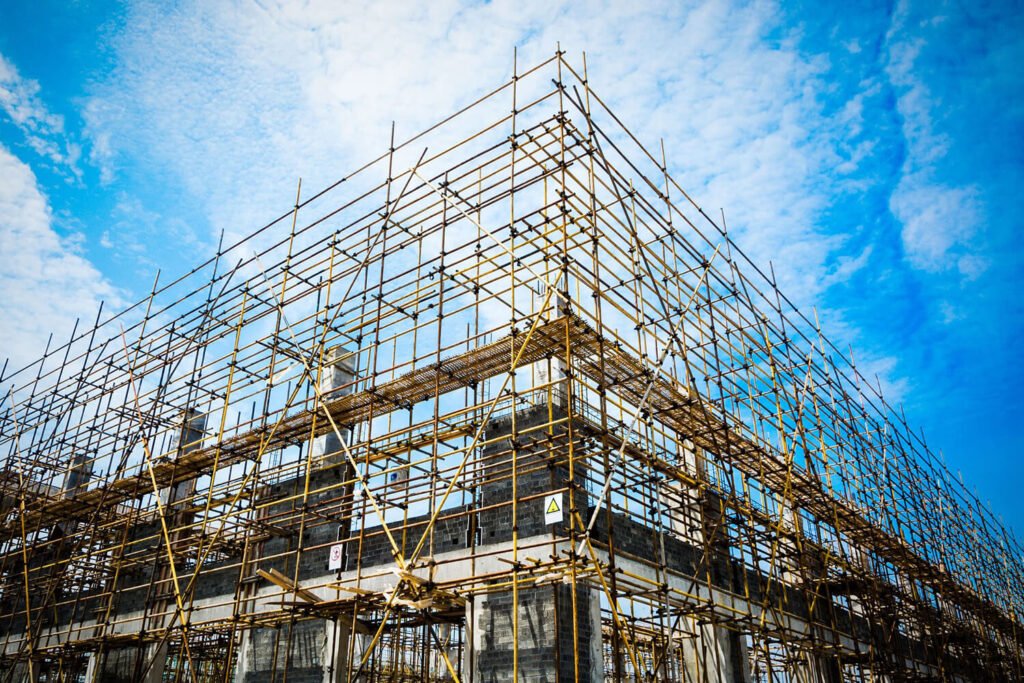Checking Out the Numerous Sorts Of Scaffolding Made Use Of in Building Jobs
The construction market counts heavily on various types of scaffolding to fulfill certain task demands, each offering distinctive benefits and applications. Conventional frame scaffolding provides a durable foundation for basic tasks, while suspended scaffolding is vital for job on high-rise frameworks.

Conventional Framework Scaffolding
Conventional framework scaffolding is just one of the most extensively made use of approaches in the building and construction market as a result of its effectiveness and adaptability. This system includes upright and straight frames that are put together to produce a steady system for products and employees. The main components include vertical messages, horizontal ledgers, and diagonal braces, which together provide a solid structure that can support substantial loads.
One of the crucial advantages of standard structure scaffolding is its adaptability to different building projects, ranging from residential buildings to huge business structures. The modular design enables easy assembly and disassembly, making it reliable for both long-lasting and temporary projects. Furthermore, the system can be personalized in elevation and size, suiting different building designs and site conditions.
Safety is critical in scaffolding applications, and standard frame systems are outfitted with guardrails and toe boards to avoid drops and ensure worker protection. Regular examinations and adherence to security policies are essential in keeping the integrity of the scaffold (Scaffolding). Overall, typical structure scaffolding remains a fundamental selection in the construction market, supplying a trustworthy platform for labor and boosting total task efficiency

Suspended Scaffolding
Suspended scaffolding supplies an one-of-a-kind remedy for construction projects that need access to elevated surfaces, specifically in circumstances where standard frame scaffolding might be not practical. This type of scaffolding is commonly suspended from the roof or top levels of a framework, making use of a system of pulley-blocks, ropes, and platforms to develop a working room that can be gotten used to various elevations.
Among the main benefits of put on hold scaffolding is its flexibility. It can be conveniently repositioned or decreased to fit adjustments in building and construction needs, making it perfect for tasks such as home window installation, façade job, and upkeep on skyscraper buildings. In addition, the marginal impact of suspended scaffolding permits much better use of ground room in urban atmospheres, where space is typically restricted.
Security is an important factor to consider in the usage of suspended scaffolding. Generally, suspended scaffolding offers a reliable and reliable solution for accessing hard-to-reach locations in different construction scenarios, enhancing both productivity and security on site.
System Scaffolding
System scaffolding, often considered a modern-day service in the scaffolding sector, includes pre-engineered elements that can be swiftly put together and adjusted for various building and construction jobs. Scaffolding. This sort of scaffolding is characterized by its modular layout, which allows for convenience and efficiency on job websites, accommodating structural needs and various heights
Usually made from high-strength steel or light weight aluminum, system scaffolding provides boosted sturdiness and security. The components scaffolder foreman consist of vertical messages, straight ledgers, and diagonal dental braces, which interconnect safely, making certain a robust structure. The layout typically includes standardized fittings, streamlining assembly and disassembly procedures, thus reducing labor time and expenses.

Rolling Scaffolding
Moving scaffolding is a versatile choice to typical set scaffolding, developed for mobility and convenience of usage on building websites. This kind of scaffolding includes a system supported by frames with wheels, permitting workers to easily transfer it as required. The mobility attribute substantially improves performance, as it lessens downtime connected with disassembling and constructing repaired scaffolding.
Generally constructed from light-weight visit the site materials such as light weight aluminum or steel, rolling scaffolding provides a tough yet portable remedy for projects calling for frequent repositioning - Scaffolding. It is especially advantageous in tasks such as paint, drywall installation, and electrical job, where accessibility to various heights and places is essential
Safety and security is vital in rolling scaffolding layout, with features such as locking wheels to stop unintentional motion when in operation, and guardrails to safeguard workers from drops. In addition, numerous designs are flexible in elevation, accommodating different project needs.
Cantilever Scaffolding

The layout of cantilever scaffolding normally involves utilizing arms or braces anchored to a structure or framework, allowing the system to prolong outside securely. Safety and security is extremely important; thus, these scaffolds must be crafted to stand up to ecological conditions and numerous tons. Routine assessment and upkeep are vital to guarantee structural honesty and employee security.
Cantilever scaffolding is favored for its convenience and reliable use space, making it a preferred choice in urban atmospheres where space restrictions are typical. In addition, it promotes less complicated access to high altitudes, eventually adding to the total efficiency of building tasks. As with all scaffolding types, correct training and adherence to safety requirements are important for workers making use of cantilever scaffolding.
Final Thought
To conclude, the diverse kinds of scaffolding made use of in building jobs each offer distinctive purposes customized to certain site needs. Traditional frame scaffolding provides security, while put on hold scaffolding provides versatility for raised tasks. System scaffolding promotes fast setting up, and rolling scaffolding boosts mobility for differing work environments. Cantilever scaffolding successfully addresses barriers in city settings. Understanding these scaffolding types is necessary for maximizing safety and security and performance in building, eventually adding to the successful completion of tasks.
Traditional structure scaffolding supplies a durable foundation for basic tasks, while suspended scaffolding is crucial for job on high-rise structures.Moving scaffolding is a flexible alternative to standard fixed scaffolding, made for wheelchair and ease of this content usage on building websites. As with all scaffolding types, correct training and adherence to security standards are essential for workers making use of cantilever scaffolding.
Conventional structure scaffolding offers security, while suspended scaffolding supplies flexibility for raised tasks. System scaffolding facilitates fast setting up, and rolling scaffolding improves flexibility for varying job environments.